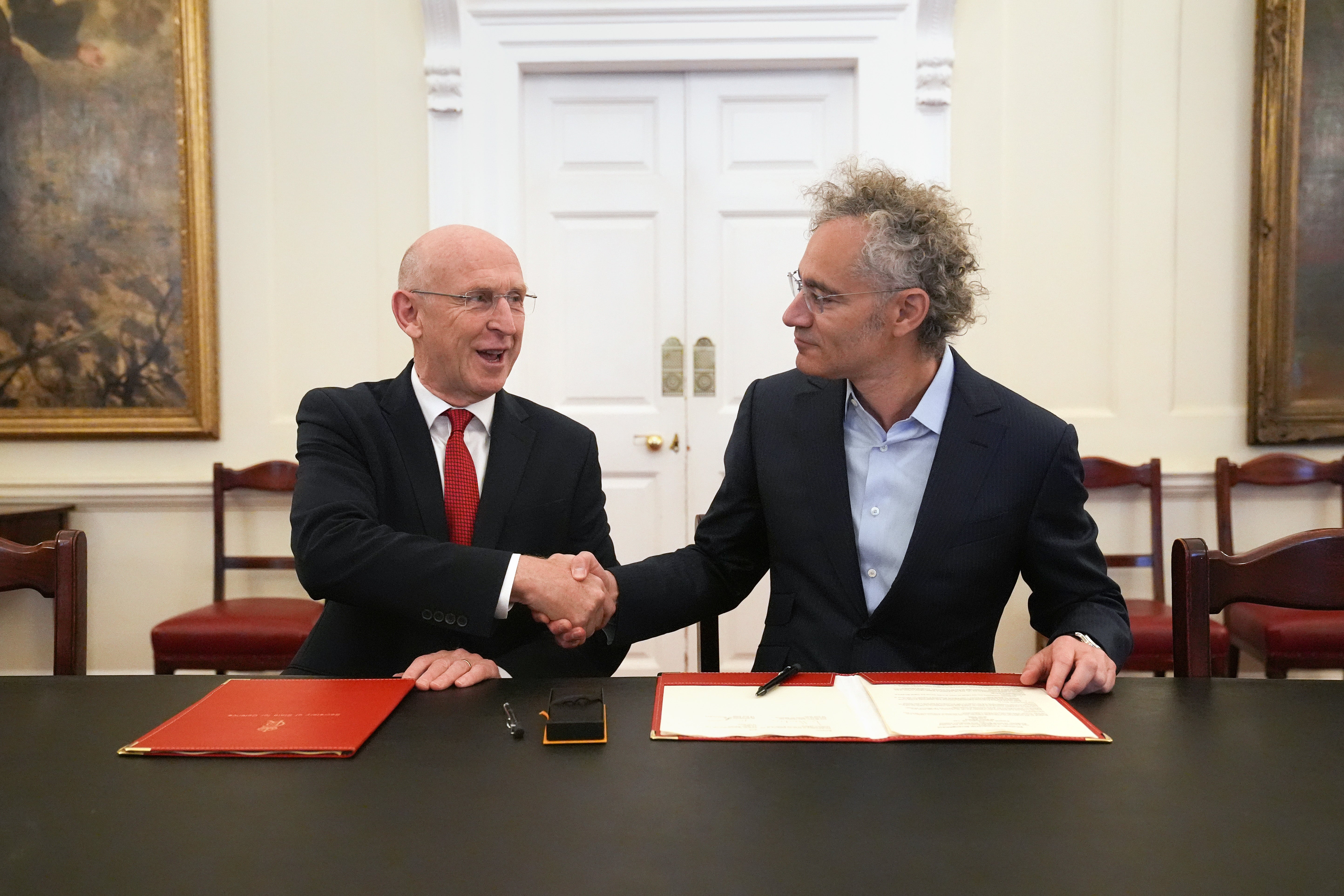Business
The British business winners and losers after US £150bn investment pledge

Donald Trump’s UK state visit coincided with an announcement that US firms will invest round £150 billion into the UK.
The trip comes amid a key period for global trade, after the US president’s tariff plans led to significant trade tensions earlier this year.
Firms in some sectors have announced fresh commitments to pump billions into the UK, in a potential boost for Chancellor Rachel Reeves.
However, some industries criticised a lack of trade deal support and tough investment conditions in the UK.
So, which sectors have been winners and losers this week:
Winners
Tech
Technology firms have been at the forefront of the major investment deals into the UK.
On Wednesday, Prime Minister Sir Keir Starmer and Mr Trump announced a “tech prosperity deal” will see the UK and US co-operate in areas including artificial intelligence (AI), quantum computing and nuclear power.
America’s top technology companies announced £31 billion of investment alongside the announcement.
These included a commitment by Microsoft to invest £22 billion in the UK to fund an expansion of Britain’s AI infrastructure and the construction of the country’s largest AI supercomputer.
Nvidia boss Jensen Huang hailed a “big week for AI in the UK” as the US chip giant committed to supporting the development of the supercomputer.
The firm agreed to deploy 120,000 advanced processors across the UK to help improve infrastructure across the British AI sector.
Google committed £5 billion of investment, focusing on improvements in research and development and AI infrastructure.
There was also a raft of smaller investments by tech companies including AI cloud computing company CoreWeave, Salesforce and AI Pathfinder.
Defence
US software company Palantir announced plans to invest £1.5 billion in the UK’s defence sector, with funding going into the development of artificial intelligence-powered capabilities to speed up decision making, military planning and targeting.
Defence Secretary John Healey said the investment was a “major vote of confidence” for the UK.
Palantir said it plans to establish the UK as its European headquarters for defence, creating 350 “high-skilled” new jobs.

Manufacturing and R&D
There were a number of investments such as £3.9 billion from Prologis to drive growth in life sciences and advanced manufacturing.
US engineering firm Stax committed £37 million to expand its operations and pioneer emission-reducing technology used at ports.
Infrastructure
Private equity giant Blackstone said it plans to invest around £100 billion into assets in the UK over the next decade, in the single largest investment commitment.
This includes £10 billion of previously announced investment into its UK data centres.
Nuclear engineering company Amentum confirmed a £150 million investment in the UK and said it plans to create more than 3,000 new jobs, to increase its UK workforce by over 50 per cent over the next four years.
X-Energy and Centrica also said they plan to build up to 12 advanced modular reactors.
Losers
Steel
The steel industry was among the main sectors left disappointed by the president’s visit.
Plans for US tariffs on UK steel exports to be scrapped have been shelved, with the UK pausing its push to bring the levy down to zero.
UK steel exports to the US currently face a 25 per cent tariff, compared with 50 per cent for other nations.
Earlier this year, the UK and the US agreed for some UK steel to be exempt from tariffs.
Gareth Stace, director-general of industry trade association UK Steel, said it was “disappointing”.
Pharmaceuticals
As part of investments between the countries, UK pharmaceutical giant GSK revealed plans to put nearly £22 billion into US R&D and manufacturing over the next five years.
The government said the deal will “strengthen UK-US life sciences ties” but it comes amid a challenging backdrop for investment for the sector in the UK.
Last week, US-based Merck said its UK operation will scrap plans for a £1 billion site in Kings Cross, which had been due to open in 2027.
Bosses blamed the government for paying too little for medicines and not investing enough in the sector, as it confirmed the move, which will impact around 125 jobs.
Days later, AstraZeneca announced it had paused plans to invest £200 million at a Cambridge research site in the latest major blow for the sector.
Industry bosses told MPs this week that the “difficult” environment in the UK and pressure on pricing had made the UK a less attractive investment environment than other countries such as the US.
Mr Trump told reporters on Thursday that pharmaceutical firms were coming back to the US from other countries.
“Car companies are moving in, AI is moving in, everybody’s coming in… The drug companies are coming back, they all want to be there – they sort of have to be there – but they all want to be there.”
Business
VB G RAM G: A Reimagined Rural Employment Guarantee With A Development Thrust

Last Updated:
Modi government’s VB G RAM G Bill replaces MGNREGA, raising job days from 100 to 125, boosting tech-driven transparency, and enhancing state flexibility amid Opposition protests.
Since FY15, the cumulative budgetary allocation to MGNREGA has reached Rs 8.64 lakh crore, about 3.6 times that of the UPA period.
As the Modi government introduced the VB G RAM G Bill — Viksit Bharat – Guarantee for Rozgar and Ajeevika Mission (Gramin) in the Lok Sabha, replacing MGNREGA, the Opposition, including the Congress, vociferously protested and tore copies of the legislation in the well of the House, irked by the absence of Mahatma Gandhi’s name. Realising its bankruptcy of issues, the Congress latched onto this matter hurriedly, without examining the fine print—where none existed. What the Congress fails to acknowledge is that rural employment schemes have existed since the 1960s, and even MGNREGA did not carry Mahatma Gandhi’s name when the Bill was legislated in 2005.
Improvements to MGNREGA since 2014-15
The implementation of MGNREGA during the UPA years was riddled with weak oversight, patchy execution, and relatively shallow budget allocations. Since FY15, the cumulative budgetary allocation to MGNREGA has reached Rs 8.64 lakh crore, about 3.6 times that of the UPA period. This includes stepped-up expenditure of Rs 1.12 lakh crore during crisis periods such as the Covid pandemic.
This exponential increase in allocation translated into visible improvements in women’s participation, person-days generated, and the creation of durable rural assets. Unlike the UPA era, digitisation and geotagging of photographs have aided in improving transparency and facilitating timely payment of wages.
However, despite the ramp-up in implementation, several irregularities and structural issues — such as fake job cards, chronic delays in wage payments, quality and durability deficits in assets, and accountability gaps — have been highlighted in various Departmentally Related Standing Committee reports.
The Bill: Differentiation across multiple dimensions
The new Bill represents a comprehensive revamp of MGNREGA while retaining the core employment guarantee. It raises the guaranteed wage employment from 100 days to 125 days per household per financial year, covering more than a third of the year. While convergence, saturation, and a whole-of-government approach existed operationally under MGNREGA, these principles have now been formally embedded in the legislation, reinforcing the commitment to rural resilience and prosperity.
The Bill also mandates that wage payments be made within seven days of completion of work, compared to the earlier ceiling of 15 days.
The most defining feature of the Bill is its emphasis on technology-enabled planning, transparency, and accountability. All Viksit Gram Panchayat Plans will be aggregated into the Viksit Bharat National Rural Infrastructure Stack and integrated with the PM Gati Shakti National Master Plan to enable spatially optimised infrastructure development. Artificial intelligence will also be leveraged for planning, audits, and fraud-risk mitigation.
Biometric authentication of workers, mobile application-based and dashboard-based monitoring systems providing real-time visibility of demand, works, workforce deployment, payments, and progress, along with weekly public disclosure mechanisms — both digital and physical — covering key metrics, muster rolls, payments, sanctions, inspections, and grievance redressal — form a robust technology-driven transparency and accountability framework.
Enhancing responsibility, predictability, flexibility, and accountability for states
Earlier, states received 32 percent devolution from central taxes. This was increased to 42 percent by the Fourteenth Finance Commission. In alignment with this shift, VB G RAM G will be implemented as a centrally sponsored scheme with a 60:40 Centre-state funding pattern, replacing the earlier central sector structure.
States will also have greater flexibility to allocate funds, based on Viksit Gram Panchayat Plans, to those gram panchayats that need them the most, thereby addressing regional disparities more effectively. The Bill introduces normative allocations, enabling states to better predict finances and plan works in advance.
With technology-driven governance and the liability resting on states to provide unemployment allowance if work is not provided within 15 days, states are firmly brought within the accountability framework. When analysed together, the employment guarantee and panchayat plans clearly reinforce the demand-driven character embedded in the Bill.
Relief for farmers and support to agriculture
Agriculture and allied activities play a critical role in food security and contribute significantly to GDP. As the annadata is a key stakeholder in the vision of Viksit Bharat, farmer welfare remains a core focus of the Modi government. Initiatives such as PM-KISAN, PMFBY, the announcement of 50 percent returns over cost in MSP, and GST 2.0 reforms, including a reduction in GST on key farm inputs to five percent, reflect this commitment.
Yet, persistent challenges remain in agricultural production, with implications for food security. One major issue is the chronic labour shortage during peak sowing and harvesting periods. This concern was also flagged by the Standing Committee on Rural Development in its 2012–13 report on MGNREGA, which noted that MGNREGA works during peak agricultural seasons adversely affect labour availability for farming. While the department acknowledged the issue, it had earlier rejected a blanket ban on works during peak periods.
Recognising this challenge, and considering that over 80 percent of farmers are small and marginal, farm mechanisation levels remain low, and more than 45 percent of the cost of cultivation is labour-related, the Bill empowers states to notify, in advance, a period aggregating up to 60 days in a financial year covering peak sowing and harvesting seasons during which works under the scheme will not be undertaken. This ensures adequate availability of farm labour during critical agricultural operations.
Another major concern is that over 50 percent of India’s net sown area remains monsoon-dependent, exposing food production to high rainfall variability. With water security identified as one of the four thematic focus areas, water-related works such as irrigation support and groundwater recharge will strengthen agricultural resilience. The other thematic focus areas—connectivity, storage, and protection from extreme weather—also provide direct and indirect support to farmers.
Conclusion
The transformative VB G RAM G Bill represents continuity rather than rupture, carrying forward the spirit embedded in MGNREGA while addressing its structural shortcomings. By raising the employment guarantee from 100 to 125 days, strengthening execution through technology-enabled planning, payments, and oversight, and enhancing state participation and accountability, the Bill seeks to elevate rural employment guarantees to the next level.
In doing so, states are also poised to reap positive spillover effects across agriculture and rural infrastructure, making VB G RAM G a more holistic instrument for rural development in a Viksit Bharat.
December 20, 2025, 07:32 IST
Read More
Business
Ministers asked to take G Ram G to rural India – The Times of India

NDA functionaries, including ministers, would soon hit the ground to explain and create more awareness about benefits of the new rural employment guarantee scheme VB G-RAM-G, which has replaced the UPA-era MNREGA, to negate the opposition’s narrative. This was discussed at Friday’s Cabinet meeting, which PM Modi chaired soon after his foreign trip, sources said.TOI has learnt rural development and agriculture minister Shivraj Singh Chouhan briefed the key provisions of the new scheme to all ministers while urging them to take the message to people. Sources said the PM was also of the similar view for creating more awareness about the new law. Opposition parties may soon carry out protests against the new scheme, particularly for dropping the name of Mahatma Gandhi and increasing burden on the state govts.
Business
Mitsubishi announces $4.4bn Shriram deal – The Times of India

New Delhi: Japan’s Mitsubishi UFJ Financial Group (MUFG) will acquire a 20 per cent in non-bank finance company Shriram Finance (SFL) for $4.4 billion (Rs 39,618 crore), in what is the largest foreign direct investment in the country’s financial services space. MUFG will pick up the minority stake through preferential equity shares, Shriram Finance said in a statement.The Indian financial services outfit will issue 47.1 crore shares at Rs 840.9 each to MUFG Bank through a preferential allotment, it said in a stock exchange filing. MUFG will be able to nominate two directors on the board of Shriram Finance (SFL). The investor will also have a pre-emptive right to subscribe to pro rata shareholding. “These rights shall fall away if the shareholding of the investor in the company falls below 10 per cent on a fully diluted basis,” a press release said. In its edition on Wednesday, TOI had reported about the proposed transaction. “This collaboration combines SFL’s established domestic franchise and extensive distribution network with MUFG Banks’ global expertise and financial strength. The fund infusion will significantly enhance SFL’s capital adequacy, strengthen its balance sheet, and provide long-term growth capital. It will improve access to low-cost liabilities and potentially strengthen SFL’s credit ratings while aligning governance and operational practices with global best standards,” the NBFC said in a statement.
-

 Business6 days ago
Business6 days agoHitting The ‘High Notes’ In Ties: Nepal Set To Lift Ban On Indian Bills Above ₹100
-

 Sports5 days ago
Sports5 days agoJets defensive lineman rips NFL officials after ejection vs Jaguars
-

 Business5 days ago
Business5 days agoKSE-100 index gains 876 points amid cut in policy rate | The Express Tribune
-

 Tech6 days ago
Tech6 days agoFor the First Time, AI Analyzes Language as Well as a Human Expert
-

 Business5 days ago
Business5 days agoStudying Abroad Is Costly, But Not Impossible: Experts On Smarter Financial Planning
-

 Tech1 week ago
Tech1 week agoCursor Launches an AI Coding Tool For Designers
-

 Business1 week ago
Business1 week agoIPO Explained: Meaning, Process, Benefits, Risks
-

 Tech1 week ago
Tech1 week agoThe Disney-OpenAI Deal Redefines the AI Copyright War






